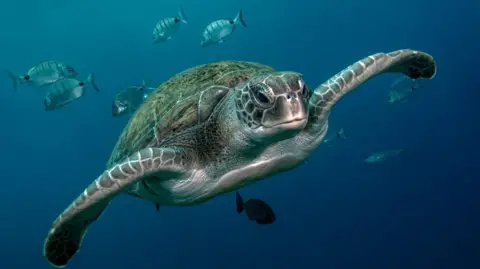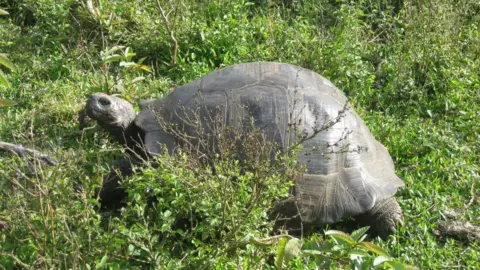Turtles rarely get cancer, new study finds
 Getty Images
Getty ImagesA global study of cancer in turtles and tortoises could lead to new ways to tackle the disease, researchers have said.
The analysis, led by experts at the University of Nottingham, showed only about 1% of the reptiles were affected, far less than in mammals or birds.
This is more striking as turtles are often long-lived, meaning that in theory there are more chances of cells going aggressively wrong.
Turtles could offer valuable clues for preventing or treating cancer in humans and are a promising model for studying healthy aging and cancer resistance, the team said.
 Dr Ylenia Chiari
Dr Ylenia ChiariAn additional characteristic was that even when cancers did appear, they almost never spread.
The study, published in the journal BioScience, was led by Dr Ylenia Chiari from the School of Life Sciences at the University of Nottingham, alongside Dr Scott Glaberman from the University of Birmingham, in collaboration with researchers from zoos across the US, UK, and Europe.
The team analysed medical records and autopsies from hundreds of zoo turtles, including individuals from Chester Zoo in the UK.
It found one radiated tortoise at Chester Zoo, named Burt, that was born in 1945, while some Galapagos and Aldabra giant tortoises have lived beyond 150 years.
 University of Nottingham
University of NottinghamDr Chiari said: "Turtles, especially iconic species like Galapagos and Aldabra giant tortoises, are famous for living long lives and growing to tremendous sizes.
"You'd expect that to mean more cancer, but our study, which combines decades of zoo records with previous research, shows how incredibly rare cancer is in these animals.
"It highlights turtles as an untapped model for understanding cancer resistance and healthy aging."
Dr Chiari felt areas for future research included strong defences against cell damage, slow metabolism reducing cellular stress, and unique genes protecting against cancer.
Dr Glaberman said: "Biodiversity has so much to teach us about how the world works. While fascinating in their own right, extreme species like giant tortoises may have already solved many of the problems humans face, including those related to aging and cancer.
"That makes biodiversity doubly worthy of protection."
Several species of turtles are classified as Endangered or Critically Endangered by international experts due to multiple threats including pressure from climate change, habitat loss, and illegal pet trade, the team said.
Follow BBC Nottingham on Facebook, on X, or on Instagram. Send your story ideas to [email protected] or via WhatsApp on 0808 100 2210.
